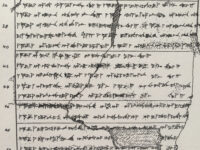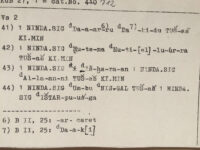 A team led by researchers at the Johannes Gutenberg University Mainz will be fully transcribing, translating and digitizing a vast collection of 30,000 Hittite-language cuneiform tablets engraved on clay in Anatolia 3,500 years ago, fired and preserved. The project has just been funded to the tune of EUR 520,000 and is expected to take three years.
A team led by researchers at the Johannes Gutenberg University Mainz will be fully transcribing, translating and digitizing a vast collection of 30,000 Hittite-language cuneiform tablets engraved on clay in Anatolia 3,500 years ago, fired and preserved. The project has just been funded to the tune of EUR 520,000 and is expected to take three years.
“This enormous funding can also be seen as recognition of Mainz as a research hub, where Hittitology has been a mainstay since the 1960s,” said Professor Doris Prechel of the Department of Ancient Studies at Johannes Gutenberg University Mainz (JGU) and partner in the collaborative project. The Hittitology Archive at the Academy of Sciences and Literature in Mainz holds the world’s largest collection of transliterated Hittite writings, in other words, texts which have been converted from the original cuneiform into the Latin alphabet. “We have a fantastic starting point here, and with the digital thesaurus we can achieve a breakthrough for Hittitology worldwide.” Prechel and her group at JGU will be contributing to the project by compiling a collection of texts on summoning rituals. These rituals mostly took the form of magical invocations designed, among other things, to gain the goodwill of the gods and protect the royal family or the political system from danger.
The cooperation partners intend to bring the remains of the Hittite culture into the 21st century. A large proportion of the 30,000 clay tablets and fragments found in the then Hittite capital of Hattusa and documented on over one million index cards are already available in digitized form. They will now be suitably adapted and provided with commentaries. The collection of texts will be accessible online via the new Hittitology Platform Mainz. It will also be possible to integrate any new cuneiform texts found at Hittite sites in future. Thus, the new platform will be a kind of living archive of cuneiform transcripts and make available a completely new way of accessing source texts for researching the culture and history of the Hittites.
 The project will have other research applications as well because Hittite is the oldest known surviving Indo-European language, the language group that includes all of the languages of Europe, northern India and the Persian Plateau. Most people in the world spread out over all the populated continents speak one.
The project will have other research applications as well because Hittite is the oldest known surviving Indo-European language, the language group that includes all of the languages of Europe, northern India and the Persian Plateau. Most people in the world spread out over all the populated continents speak one.
The current Hittitology Platform Mainz already has a large database of digitized Hittite tablets, but it’s a little unwieldy to navigate, is mostly in German and if there are any photographs in the digitized entries, I haven’t found them yet. It will be greatly expanded over the next three years.
A little ‘unwieldy to navigate’ probably nails it: Currently, I am unable to tell where the University of Würzburg instead of Mainz is involved here, but the pictures are deeply “hidden”, and back then they still programmed in Latin.
You need to chose a particular Hittite document, then it reads in Latin (upper left hand corner) of “index”, “introductio”, “imagines”, and “translatio”, and –as you have probably guessed it already– the photographs are available, when you click on “imagines” 😉
(note that to enlarge, you need to click once more).
The machine-translated into English contract of a Hittite king with Paddatiššu of Kizzuwatna (CTH 26).
“Kizzuwatna (or Kizzuwadna; in Ancient Egyptian referred to as Kode or Qode), is the name of an ancient Anatolian kingdom in the 2nd millennium BC. It was situated in the highlands of southeastern Anatolia, near the Gulf of İskenderun, in modern-day Turkey. It encircled the Taurus Mountains and the Ceyhan River. The centre of the kingdom was the city of Kummanni, in the highlands. In a later era, the same region was known as Cilicia.”
——————————————–
§ 1 / § 2 Obligation to extradite a fugitive insurgent; if the insurgent denies his guilt, extradition after taking an oath by dignitaries of the country of origin determined by the extraditing ruler.
§ 3 Guarantee of the integrity of princes and court servants of one contracting party who are sent to the country of the other contracting party
§ 4 Obligation to report a murder plan directed against the ruler by a subject living in his country.
§ 5 Commitment to the extradition of village people who transfer with their livestock into the territory of the contracting party.
§ 6 Obligation to extradite personnel who transfer to the territory of the contracting party without the entire village population having left their residence with their livestock, after taking an oath by dignitaries of the country of origin, who are appointed by the extraditing ruler.
§ 7 / § 8 Agreement on equal punishment of cattle herders who commit theft in the country of the contracting party; the stolen goods are to be replaced twice, and in addition a penalty of 30 shekels is to be paid. If the thief is not able to pay, liability(?) shall be imposed. Thieves who are not cattle herders will suffer the death penalty.
§ 9 / § 10 Obligation to pay compensation for a subject of the other contracting party killed or sold into slavery by a subject of one contracting party.
The TEXT ITSELF (with line numbers)
[§ 1]
1 — [When a servant of the Great King plans an attempt on the life of his master].
2 — [(and) enters the land of Kizzuwatna,]
3 — [and the great [king] then [sends] for the refugee,]
4 — [by speaking like this:]
5 — [“He has rebelled against me,”]
6 — [give it back to me by all means!”,]
7 — [if] the word is true,
8 — [shall the refugee be brought back to him.]
9 — [And if the refugee denies it (with the words):]
10– “[I personally] do not rebel against [him]!
11 — the word [he lies].
12 — [Whatever respected men of the country Ḫatti Pa]ddatiššu promotes to the oath,
13 — [which will] be [made to take an oath],
14 — and (then) [one] will [bring] the refugee back.
[§ 2]
15 — [And] if a servant of Paddatisteus plans an attack on the life of his master
16 — (and) enter the country Ḫatti,
17 — [(and) Pa]ddatiššu then sends for the refugee,
18 — by speaking like this:
19 — “He has rebelled against me,
20 — be sure to give it back to me!”,
21 — [if] the word is true,
22 — the refugee shall be brought back to him.
23 — And if the fugitive denies it (with the words)
24 — “[I personally] am not rebelled against him!
25 — the word he lies.
26 — And whichever respected men of the country Kizzuwatna calls [the great [king] to the [E]id,
27–they will be made to take an oath,
28 — and (then) the refugee will be brought back.
[§ 3]
29 — [When the] Great [king] sends his son or his servant to Paddatiššu,
30–then (him) Paddatiššu will not inflict [gusts] of anything.
31 — And if Paddatišššu sends his son or his servant [into the land of the great king],
32 — then the great king will not do evil to him.
[§ 4]
33 — [If a thief of the great king plans an attack on the life of his master
34 — (and) he (she) stays in the country Ḫatti
35 — (and if) [Padd]atiššu hears about it,
36 — then he will call him the Great King.
37 — And if a servant of Paddatistehu [on the life] of his master plans an attack
38 — (and) he (she) stays in the country of Kizzuwatna
39 — (and) the great king hears of it,
40 — then he (he) will call Paddatiššu.
[§ 5]
41 — [When (the population of a) settlement of the great king with its personnel1, its property, its cattle (and) its small livestock sets out
42 — and enters the land of Kizzuwatna,
43 — [(then) will take Paddati]ššu (her)
44 — and (bring her) back to the great king.
45 — And when (the population of) a settlement of Paddatiššu [together with] its [person]al, its property, its cattle, and its small livestock sets out
46 — and enters the country Ḫatti,
47 — [then] [the great king] (she) will seize
48 — and bring them back Paddatiššu each time.
[§ 6]
49 — [If anyone]d from the country Ḫatti says malice:
50 — “The (population of a) settlement is broken up with its personnel [(and) its property
51 — (and then) entered the land of Kizzuwatna!”
52 — and (the population of that) settlement has not (at all) left with its (whole) personnel [(and) its possessions],
53 — (but) there are (people) in the settlement who continue the grazing activity2,
54 — [whoever is] a respected [man] of the country Ḫatti,
55 — which Paddatiššu demands to take an oath,
56 — [den3 will be made to take an oath]
57 — and (then) the staff will be brought back.
58 — And if anyone from the country says Kizzuwatna [out of wickedness]:
59 — “The (population of a) settlement has left with its personnel and its property
60 — [and then entered the country Ḫatti]!”
61 — and the (population of that) settlement has not (at all) set out with its (whole) personnel (and) its possessions,
62 — [(but) in the settlement there are] (people) present, [who] continue the grazing,
63 — [whoever is] a respected [man] of the country of Kizzuwatna,
64 — [whom the great king demands to the egg],
65 — he shall be made to swear an oath
66 — and (then) the staff will be brought back.
[§ 7]
67 — [When cattle herders with] cattle4 from the country Ḫatti descend into the territory of the country Kizzuwatna
68 — [when they steal (something there),]?
69 — (then) they become [the thief] good, which they have stolen5,
70 — replace his master6 twice7,
71 — and 30 shekels of silver he will give8 (additionally).
72 — [If] he does not give [the 30 shekels of silver],
73 — then he is a thief,
74 — and he will be taken into custody? 9.
75 — [If a man from the country Ḫatti who] is not a cattle herder
76 — to steal (to the land of Kizzuwatna) goes,10
77 — then you kill him.
[§ 8]
78 — [When a ?11 cattle herder with cattle]s from the country of Kizzuwatna enters the territory of the country Ḫatti
79 — [and steals something,]?
80 — [(then) they become [the thief] good, which they have stolen12,
81 — replace his master13 twice,
82 — and 30 shekels of silver he will give (additionally).
83 — [If] he does not give [the 30 shekels of silver],
84 — (then) he is a thief
85
Picture: hethport.adwmainz.de/fotarch/touchpic.php?ori=&po=0&si=100&bildnr=B2851&fundnr=1818%2Fc&xy=b69aad96ac07061b14a7d29f17adee19